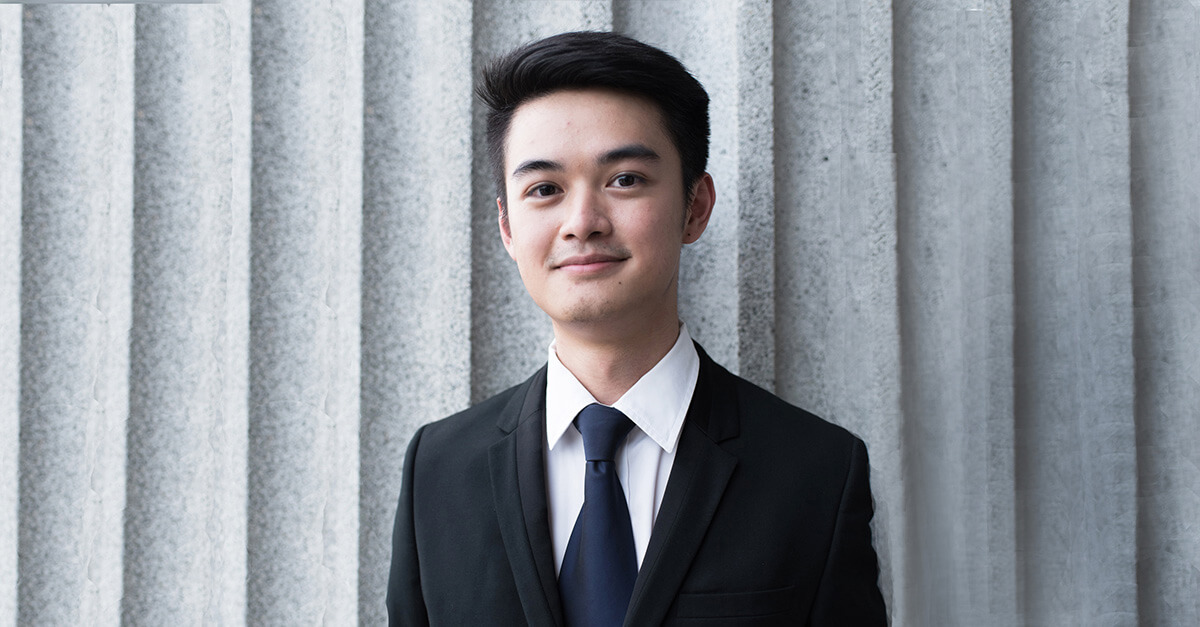
Cheng You Duen graduated from SMU in 2019 with a Bachelor of Laws degree. Given his success at SMU, his story may be both inspirational and informative for aspiring law students in Singapore.
What influenced you to pursue your degree? What excites you intellectually?
I chose to read law as I’ve always been fascinated by the idea of law as a set of rules that guide social behaviour, distinguishing between right and wrong. I was always curious about what made some actions lawful while other actions not. More specifically, I was particularly interested in the justifications behind controversial laws, and what better way to further understand these issues than to pursue a degree in law?
Did you consider any other schools? If so, why did you ultimately choose SMU?
I was offered a place to read law at King’s College London, University College London, as well as Queen Mary University London. I was also offered the opportunity to pursue a double degree in Accountancy and Business at Nanyang Technological University, and Accountancy at the National University of Singapore. My interest in law narrowed down my choice to deciding between reading law at SMU or overseas.
I ultimately chose SMU for several reasons. First, as I’ve always aimed to practice law in Singapore, I felt that reading law locally would provide me with more relevant knowledge for my future career than reading law overseas. Second, pursuing a degree locally would be significantly more cost-effective. Lastly, I was attracted to SMU’s interactive pedagogy and small class sizes, which I felt would create an ideal learning environment that I could thrive in.
How would you describe your experience in your programme at SMU?
Reading law at SMU has undoubtedly been a challenging, but rewarding, experience. Due to the intellectual rigour of reading law, law modules generally require a large amount of pre-class preparation, with many assigned readings that require many hours spent in the library.
That said, SMU’s emphasis on project-based learning and presentations have allowed me to develop my oratorical and presentation skills. Additionally, SMU’s encouragement of class participation has also provided me with the opportunity to hone my ability to voice my opinion and defend that opinion—a useful skill in any context.
Lastly, SMU’s small cohort size and the focus placed on group work has allowed me to form strong friendships with my peers. Many of my closest friendships have been forged with people I’ve met through law school.
What has been your favourite course so far, and why?
It’s difficult to pick a favourite, but if I had to, I would pick Legal Theory and Philosophy as my favourite course thus far. The course allowed me to critically analyse the justifications behind specific laws, as well as explore issues that fascinate me personally, such as the nature of law, what the role of a lawyer should be, and unjust laws. Other courses I’ve enjoyed greatly include Criminal Law and Commercial Conflict of Laws.
What type of co-curricular activities are you involved with?
In the second semester of my sophomore year, I was elected as the President of the SMU Law Society (The Bar). As President, I led a nine-member Management Committee to improve student life in the School of Law through the planning of student events such as Law Camp 2017 and Law Graduation Night 2017. The Committee also facilitated students’ professional and academic development through the organisation of workshops and networking sessions in collaboration with various law firms. As President of the SMU Law Society, I was also a member of the SMU Student Association Council, SMU’s highest student leadership body. As a council member, I was tasked with representing the interests of law students’ ensuring that they are both protected and advanced.
I’m also currently a Student Leader at the SMU Pro Bono Centre, where practicing lawyers provide free legal advice to indigent applicants. As a student leader, I’m involved in liaising with applicants and lawyers, as well as overseeing the execution of weekly legal clinics.
Have you had internships? If so, how did you search for internship opportunities?
Yes, over the summer break of my sophomore year, I completed a total of 11 weeks of internships with three law firms. Most of my internships were sourced through personal research by visiting the online webpages of various law firms as well as through word of mouth by consulting seniors on their internship experience with various firms.
What are your career aspirations?
I’ve always been interested in pursuing litigation, specifically criminal litigation. After graduation, I hope to gain as much knowledge and experience as possible to help me realise this goal.
How has SMU helped prepare you for this type of career?
The various projects and presentations have helped train my oratorical skills that would inevitably be beneficial towards my career goals. Additionally, certain modules such as Property Law and Legal Research and Writing include Mooting as part of the assessment criteria, thereby providing further exposure towards litigation practice and advocacy. Also, SMU provides many student leadership opportunities. As the President of the SMU Law Society, I was required to serve as a bridge between the student body and the school administration. The experience has definitely equipped me with numerous soft skills and problem-solving skills, which I believe will be very useful for my career in the future.
Are there any resources that would help you with career development that you’re not currently getting?
No, I wouldn’t say that there are any career development resources that I’m not getting. SMU’s Dato’ Kho Hui Meng Career Centre provides us with a wide array of resources that allow us to further our career development. Additionally, SMU’s Finishing Touch Workshop series equips us with relevant skills for our career development, such as interview and etiquette workshops. Also, the SMU Law Society organises regular annual engagement and networking sessions with various law firms. These activities allow us to converse with practicing lawyers to learn more about various fields of legal practice which in turn enables us to make informed career choices in terms of internship and training contract opportunities.
Where do you see yourself in 5 years?
Behind a desk at a law firm, doing what I’ve worked so hard to achieve ever since I was young.
